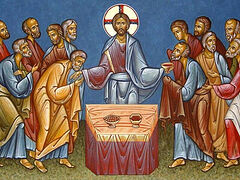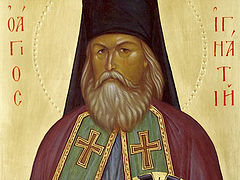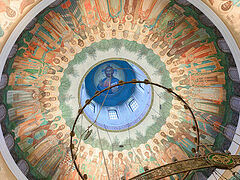One of the most common objections I hear from protestants criticizing Orthodoxy, or even Catholicism, is: “The saints are dead, they can't hear you.”
The saints in Heaven are not dead. That is a fundamental rejection of what Christ did during His decent into Hades. He emptied the graves of the righteous dead and pulled everyone into heaven. Christ Himself said in the Gospels, God is not the God of the dead, He is the God of the living. For in Christ, all are alive (Luke 20:38).
The saints who are alive in Christ in Heaven partake of the uncreated energies of God, as He shares some of His attributes with us (cf. 2 Pet.1:3–4). Therefore, the saints in Heaven are actively aware of what is going on with us down here on earth in the Church and act as a cloud of witnesses for us (cf. Heb. 12:1–2). This is also evidenced by the fact that St. John was able to hear all living creatures in Heaven, on earth, and under the earth (cf. Rev. 5:13). Because they are aware of us, they very much are still concerned with what goes on with us here on earth and actively cheer us on until the end of days, praying fervently for us on our behalf. They want vengeance for us even in Heaven (cf. Rev. 6:10), and it's been shown that Rachel wept over her lost children of Benjamin and Judah during King Herod’s massacre of the infants (Matt. 2:18, referencing Jer. 31:15). The saints praying for us is seen in the Bible (Rev. 5:8, and 8:3–4), and with all of this being put together, the cherry on top is that if all these accounts are true and they are aware of us, they intercede for us on our behalf, and are alive in Christ, then what more shall we doubt? That we can ask the saints in Heaven to pray for us, just as the holy Apostle James encourages us to pray for one another. He also says the prayers of a righteous man avails much (James 5:16). This means that some people's prayers mean more to God than others, which is a fact (see Prov. 15:33). This sentiment that some people’s prayers are worth more than others is reflected many times in the scriptures, but one particular instance is reflected in St. Job, where God tells Eliphaz that he and his two friends are unworthy before Him, that they need to sacrifice bulls and rams before God, that Job will pray for them, and that God will actually answer if Job prays (cf. Job 42:8). Therefore, if that is true, then since the saints in Heaven have absolutely no more sin, they have MUCH more valuable prayers than anyone on earth does. Remember what Our Lord said in the Gospels that he who is least in the Kingdom of Heaven is greater than the greatest man on earth (Matt. 11:11). So why wouldn’t we seek out the prayers of those who are deified in heaven if they hold this much power in prayer? We Orthodox Christians believe it would be unwise not to ask them.
There are usually two objections that protestants bring up if they make it this far into the scriptural references that I listed above.
Protestant objection 1) They usually bring up this verse: For there is one God and one Mediator between God and men, the Man Christ Jesus (1 Timothy 2:5). This is not an adequate objection to anything I’ve said. The word mediator here means “bridge,” not intercessor. Christ, is the only mediator between God and man because Christ is both God and Man. Since He is both God and Man, He alone bridges the gap of salvation between God and man because He is the God-Man. Mediation is not intercession.1 Tim 2:5 is a soteriology verse. It talks about salvation, not prayers and intercession. These are two completely different things, so this verse is not saying what some Protestants might claim it says.
Protestant objection 2) “Okay, so maybe the saints are aware of us and pray FOR us, but where does it say that we can pray TO them? Where does scripture show anybody asking a saint for intercession?”
This is easy to show. The parable of the Rich man and Lazarus is where we see this happen (Luke 16:19–31). The whole parable is fascinating, but verses 24, 27, and 30 particularly stand out, because the man in hades is asking not for Jesus or for God the Father, but for Abraham to have mercy on him. This shows that God delegates authority to His saints, and this account by Christ Himself reveals the active communion of these people beloved of God. As the Orthodox Study Bible annotated, "A man who isn't even a believer calls out from Hades and converses with Abraham." Souls of the departed have awareness of and concern for the state of those still on earth, but the intercessions of the wicked man are also heard, although they avail nothing, which in contrast to James 5:16. If this is the case in the Old Covenant, it’s even more the case in the New Covenant.
There are examples of these things even in the Old Testament as well. A couple of examples are Tobit 12:15, when Archangel Raphael claims himself to be the angel who brings the prayers of the saints to God. This, however, does not imply that the only interaction of the saints who have passed on is through prayer to God for us; but in some very rare circumstances, by God’s divine permission, saints of Old Testament can directly interact and appear to the faithful. In 2 Mac. 15:12-16, Onias the High Priest who has been dead for several decades, and the Prophet Jeremiah who had been dead for centuries, appears to Judas. Onias tells us in verse 14 that Jeremiah is one who loves his brothers and prays fervently for the faithful and the whole city. This is an amazing text that shows the saints were alive before the general resurrection, as also shown on Mt. Tabor when Moses and Elijah were with Christ during his Transfiguration (Matt. 17:1–4). In 2 Mac. 12:45, this sentiment of believers praying for one another is also mirrored in the opposite way. It displays a long-standing Jewish tradition of praying on behalf of the souls that have departed this life. That is because intercession goes both ways! Not only do the saints pray for us, but we also pray for those who have reposed. There has always been a relationship and connection between the souls on earth and the souls of the spiritual realm. The Church Militant (Christians on earth) and the Church Triumphant (Christians in Heaven) are one united Church, and they always have been. That the Church triumphant and Church militant are not separated entities or Churches, but are one united Church is shown in St. Paul’s letter, when he says, From whom the whole family in heaven and earth is named (Eph. 3:15).
In conclusion, the prayers and active communion with the saints is not a pagan distortion, it’s not a Roman conspiracy, and this is not worship of the saints. This is a true and very ancient and important practice that all Christians must embrace. For we have a family in Heaven who cares for us, and we should care for them, too. Keep the traditions that have been passed down to us. Through the prayers of the Most Pure Mother of God and of our holy fathers, Lord Jesus Christ, have mercy on us!





